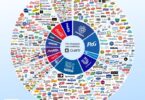It was revealed in a congressional investigation last week that seven major baby food brands contained “dangerous levels” of heavy toxic metals.
The brands investigated include: Gerber (owned by Nestle), Plum Organics (owned by Campbell Soup), Beech-Nut, Sprout Organic, Earth’s Best Organic, Happy Baby, Parent’s Choice (Walmart’s private label brand).
Of the heavy metal contaminants found in the food are among the most dangerous, which include: Arsenic, Mercury, Lead, Cadmium.
The companies under investigation have been very uncooperative, and have denied any wrongdoing.
The makers of Happy Baby, Nurture Inc., claims it only sells products that have been rigorously tested and don’t have contaminant ranges outside the FDA guidelines.
We can say with the utmost confidence that all Happy Family Organics products are safe for babies and toddlers to enjoy.
Spokesperson for Happy Baby
But the investigation results tell a different story. It was found that over 25% of Happy Baby products that the company tested contained over 100 parts per billion of inorganic arsenic.
The following is a breakdown of the specific toxic metals found in each brand and the maximum levels of each toxin:
Gerber
- Arsenic (90 parts per billion)
- Lead (48 parts per billion)
- Cadmium – 75% of their carrots tested for excess cadmium (87 parts per billion)
- Mercury – Gerber does not test for mercury in their products
Happy Baby
- Arsenic (180 parts per billion)
- Lead (641 parts per billion)
- Cadmium – 65% of products tested for at least 5 parts per billion
- Mercury (10 parts per billion)
Earth’s Best Organic
- Arsenic (180 parts per billion)
- Lead (352 parts per billion)
- Cadmium – at least 102 different ingredients tested positive up to 260 parts per billion
- Mercury – Earth’s Best Organic does not test for mercury in their products
Beech-Nut
- Arsenic – Beech-Nut routinely uses high-arsenic additives to address issues like “crumb softness” (913 parts per billion)
- Lead – at least 629 ingredients ranging from 20 to 887 parts per billion
- Cadmium – at least 102 ingredients ranging from 20 to 102 parts per billion
- Mercury – Beech-Nut does not test for mercury in their products
The report from The Truth About Cancer explains the health effects of these metals, according to The Agency for Toxic Substances and Disease Registry (ATSDR).
Inorganic Arsenic – #1 on the ATSDR list
The known health risks of arsenic exposure include respiratory, gastrointestinal, hematological, hepatic, renal, skin, neurological and immunological effects, as well as damaging effects on the central nervous system and cognitive development in children.
Studies have concluded that arsenic exposure has a significant negative effect on neurodevelopment in children. This negative effect is most pronounced in Full Scale IQ, and more specifically, in verbal and performance domains as well as memory. For every 50% increase in arsenic levels, there is an approximately 0.4 decrease in the IQ of children.
A study of Maine schoolchildren exposed to arsenic in drinking water found that children exposed to water with an arsenic concentration level greater than 5 parts per billion showed significant reductions in full scale IQ, working memory, perceptual reasoning, and verbal comprehension scores. The authors pegged 5 ppb as an important threshold.
Likewise, a study of children in Spain found that increasing arsenic exposure led to a decrease in the children’s global motor, gross motor, and fine motor function scores. Boys in particular were more susceptible to arsenic’s neurotoxicity.
Lead – #2 on the ATSDR list
Even small doses of lead exposure are hazardous, particularly to children. Lead is associated with a range of bad health outcomes, including behavioral problems, decreased cognitive performance, delayed puberty, and reduced postnatal growth. According to FDA, lead is especially dangerous to infants and young children.
The FDA acknowledges that:
High levels of lead exposure can seriously harm children’s health and development, specifically the brain and nervous system. Neurological effects from high levels of lead exposure during early childhood include learning disabilities, behavior difficulties, and lowered IQ. Because lead can accumulate in the body, even low-level chronic exposure can be hazardous over time.
Lead exposure severely affects academic achievement in children. Even at low levels, early childhood lead exposure has a negative impact on school performance. Two separate studies of schoolchildren in Detroit and Chicago public schools found a strong inverse relationship between lead exposure and test scores. In the Detroit study, there was a “significant association” between early childhood lead exposure and decreased standardized test performance, with lead exposure strongly linked to an adverse effect on academic achievement.
The Chicago study found that higher blood lead concentrations were associated with lower reading and math scores in 3rd grade children. Increased blood lead concentrations correlated with a 32% increase in the risk of failing reading and math.
Mercury – #3 on the ATSDR list
Studies of mercury’s effect on childhood development have primarily been conducted by considering the mother’s exposure to mercury while pregnant. In these instances, prenatal mercury exposure has been consistently associated with adverse subsequent neuro-development.
Prenatal mercury exposure is also related to poorer estimated IQ.27 Beyond prenatal exposure, higher blood mercury levels at 2 and 3 years of age were positively associated with autistic behaviors among preschool-age children.
Cadmium – #7 on the ATSDR list
Cadmium is associated with decreases in IQ, as well as the development of ADHD. A 2018 study found that cadmium exposure negatively affected children’s Full Scale IQ, particularly among boys. Boys exhibiting higher amounts of cadmium exposure had seven fewer IQ points than those exhibiting less cadmium exposure. A 2015 study similarly found a significant inverse relationship between early cadmium exposure and IQ.
A 2018 study linked cadmium exposure to ADHD, finding that the disorder was more common among children with the highest levels of cadmium exposure as compared to a control group. Most importantly, cadmium is an established human and animal carcinogen. Studies show that cadmium increases risk for lung, kidney, breast, and prostate cancers.
As usual, we’ve learned that these companies don’t give a rodent’s hindparts about consumer safety. The food that they market to our young children is laden with some of the most toxic elements on earth, and the response from the corporate world is that their “standards” are better than anyone else.
AUTHOR COMMENTARY
[9] But they that will be rich fall into temptation and a snare, and into many foolish and hurtful lusts, which drown men in destruction and perdition. [10] For the love of money is the root of all evil: which while some coveted after, they have erred from the faith, and pierced themselves through with many sorrows. [11] But thou, O man of God, flee these things; and follow after righteousness, godliness, faith, love, patience, meekness.1 Timothy 6:9-11
But whoso shall offend one of these little ones which believe in me, it were better for him that a millstone were hanged about his neck, and that he were drowned in the depth of the sea.
Matthew 18:6
It is clear these companies want to poison the children. How in the world do heavy metals end up in these products?! It’s ridiculous, especially when these products are extremely overpriced.
If you want to feed your babies, and keep them healthy, then just give them the things from God’s creation. Make your own nutrient dense formulas for the baby to eat: what a concept.
[13] He watereth the hills from his chambers: the earth is satisfied with the fruit of thy works. [14] He causeth the grass to grow for the cattle, and herb for the service of man: that he may bring forth food out of the earth; [15] And wine that maketh glad the heart of man, and oil to make his face to shine, and bread which strengtheneth man’s heart. [16] The trees of the LORD are full of sap; the cedars of Lebanon, which he hath planted; Psalm 104:13-16
May all those involved with these baby food companies face a fiery judgment from the Lord!
The WinePress needs your support! If God has laid it on your heart to want to contribute, please prayerfully consider donating to this ministry. If you cannot gift a monetary donation, then please donate your fervent prayers to keep this ministry going! Thank you and may God bless you.







